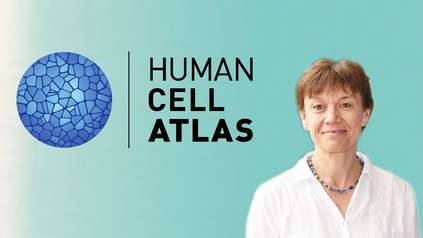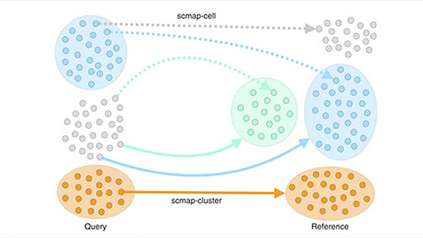Origins of immune system mapped, opening doors for new cancer immunotherapies
A first cell atlas of the human thymus gland could lead to new immune therapies to treat cancer and autoimmune diseases. Researchers from the Wellcome Sanger Institute, Newcastle University and Ghent University, Belgium, mapped thymus tissue through the human lifespan to understand how it develops and makes vital immune cells called T cells. In the future, this information could help researchers to generate an artificial thymus and engineer improved therapeutic T cells.
Published today in Science, this human thymus atlas has revealed new cell types and identified signals that tell immature immune cells how to develop into T cells. The atlas could also help scientists understand diseases that affect T cell development such as severe combined immunodeficiency (SCID), and adds to the Human Cell Atlas initiative which is creating a Google map of the entire human body.
The thymus gland is located in the chest and produces T cells, key white blood cells that fight infection and disease. These T cells then leave the thymus to enter the blood and other parts of the body to mature further. T cells seek out and destroy invading bacteria and viruses, and also recognise cancer cells and kill them.
Problems in thymus development causes defective T cell generation. This can result in severe immune deficiencies such as SCID, leaving people susceptible to infections. lternatively, it can affect T cell regulation resulting in autoimmune diseases such as Type 1 diabetes. While mature T cells have been well studied, the development of the human thymus and T cells within it is not fully understood.
Researchers used single cell technology to isolate and analyse around 200,000 individual cells from the developing thymus, and child and adult thymus tissue. They looked at which genes were active in each individual cell to identify the cells, discovering new cell types, and used those genes as tags to map each cell to its exact location in the thymus.
“We have produced a first human thymus cell atlas to understand what is happening in the healthy thymus across our lifespan, from development to adulthood, and how it provides the ideal environment to support the formation of T cells. This openly available resource will allow researchers worldwide to understand how the immune system develops to protect our body.”
Dr Jongeun Park– first author on the study from the Wellcome Sanger Institute
Therapeutic T cells are currently being used in the clinic to treat B-cell lymphoma and leukaemia cancers*, however a major drawback to these treatments is creating the right subtype of T cells.
“With this thymus cell atlas, we are unravelling the cellular signals of the developing thymus, and revealing which genes need to be switched on to convert early immune precursor cells into specific T cells. This is really exciting as in the future, this atlas could be used as a reference map to engineer T cells outside the body with exactly the right properties to attack and kill a specific cancer – creating tailored treatments for tumours.”
Professor Muzlifah Haniffa– a senior author of the study from Newcastle University and Senior Clinical Fellow at the Wellcome Sanger Institute
“We now have a very detailed understanding of how T cells form in healthy tissue. We have been able to identify a similar population of precursor cells in the developing thymus and liver, and we believe that these precursors are important for initiating T cell development in the foetus, and for the establishment of a fully competent thymus organ. This is helping us put jigsaw pieces together to get a bigger picture of how immunity develops.”
Professor Tom Taghon– a senior author of the study from Ghent University, Belgium
The thymus is unusual in that it is largest and most active in childhood and shrinks after puberty. The thymus has been called the ‘pacemaker of life’ and by age 35 has almost disappeared. Understanding how the thymus develops and then withers could cast light on aging and how the immune system changes through life.
“This map of the thymus is an important part of the Human Cell Atlas mission to chart every cell type in the human body. It is helping us learn about developmental pathways within the body, and the age-associated decline of the immune system. This has applications in cellular engineering, including the possibility of creating an artificial thymus for regenerative medicine.”
Dr Sarah Teichmann– a senior author from the Wellcome Sanger Institute and co-chair of the Human Cell Atlas Organising Committee
More information
* CAR-T – chimeric antigen receptor T-cell – therapy is specifically developed for each individual patient and involves reprogramming the patient’s own immune system cells which are then used to target their cancer. Car-T therapy can help children and young people with B cell acute lymphoblastic leukaemia and adults with diffuse large B-cell lymphoma and primary mediastinal B-cell lymphoma . https://www.england.nhs.uk/cancer/cdf/car-t-therapy/
Publication:
J E Park et al. (2020). A cell atlas of human thymic development defines T cell repertoire Formation. Science. DOI: 10.1126/science.aay3224
Funding:
This study was supported by Wellcome, Wellcome Human Cell Atlas Strategic Science Support (WT211276/Z/18/Z), ERC, EU MRG-Grammar, the Lister Institute for Preventive Medicine and NIHR and Newcastle-Biomedical Research Centre, Research Foundation Flanders and Ghent University Special Research Fund, and EMBO.
Selected websites
National Institute for Health Research (NIHR) Newcastle Biomedical Research Centre (BRC)
Professor Haniffa leads the Skin & Oral Disease Theme for the NIHR Newcastle BRC. The Theme focuses on research in to inflammatory, long-term skin and oral conditions, with a view to understanding the progress of these diseases and to generating new diagnostics and therapeutics. The NIHR Newcastle BRC itself is a partnership between Newcastle Hospitals NHS Foundation Trust and Newcastle University. It is the only BRC in the country to focus on the conversion of lab-based research around ageing and long-term conditions into practical and meaningful benefits for patients, the public and the health and care system. Find out more at https://www.newcastlebrc.nihr.ac.uk/
About Newcastle University
Newcastle University, UK, is a thriving international community of some 27,750 students from over 130 countries worldwide. As a member of the Russell Group of research intensive universities in the UK, Newcastle has a world-class reputation for research excellence in the fields of medicine, science and engineering, social sciences and the humanities. Its academics are sharply focused on responding to the major challenges facing society today. Our research and teaching are world-leading in areas as diverse as health, culture, technology and the environment. The Research Excellence Framework 2014 (REF) placed Newcastle University 16th in the UK for Research Power and the vast majority of our research (78%) was assessed to be world-leading or internationally excellent. Newcastle University is committed to providing our students with excellent, research-led teaching delivered by dedicated and passionate teachers. This is reaffirmed by achieving the best possible outcome – a Gold Award – in the Teaching Excellence Framework (TEF). https://www.ncl.ac.uk/press/about/keyfacts/
Ghent University
Ghent University is one of the major universities in the Dutch-speaking region of Europe. It distinguishes itself as a socially committed and pluralistic university in a broad international perspective. 86 faculty departments, spread over 11 faculties, offer high-quality courses in every one of their scientific disciplines. With a view to cooperation in research and community service, numerous research groups, centres and institutes have been founded over the years. https://www.ugent.be/en
The Wellcome Sanger Institute
The Wellcome Sanger Institute is a world leading genomics research centre. We undertake large-scale research that forms the foundations of knowledge in biology and medicine. We are open and collaborative; our data, results, tools and technologies are shared across the globe to advance science. Our ambition is vast – we take on projects that are not possible anywhere else. We use the power of genome sequencing to understand and harness the information in DNA. Funded by Wellcome, we have the freedom and support to push the boundaries of genomics. Our findings are used to improve health and to understand life on Earth. Find out more at scion-02.sandbox.sanger.ac.uk or follow us on Twitter, Facebook, LinkedIn and on our Blog.
About Wellcome
Wellcome exists to improve health by helping great ideas to thrive. We support researchers, we take on big health challenges, we campaign for better science, and we help everyone get involved with science and health research. We are a politically and financially independent foundation. https://wellcome.org/




